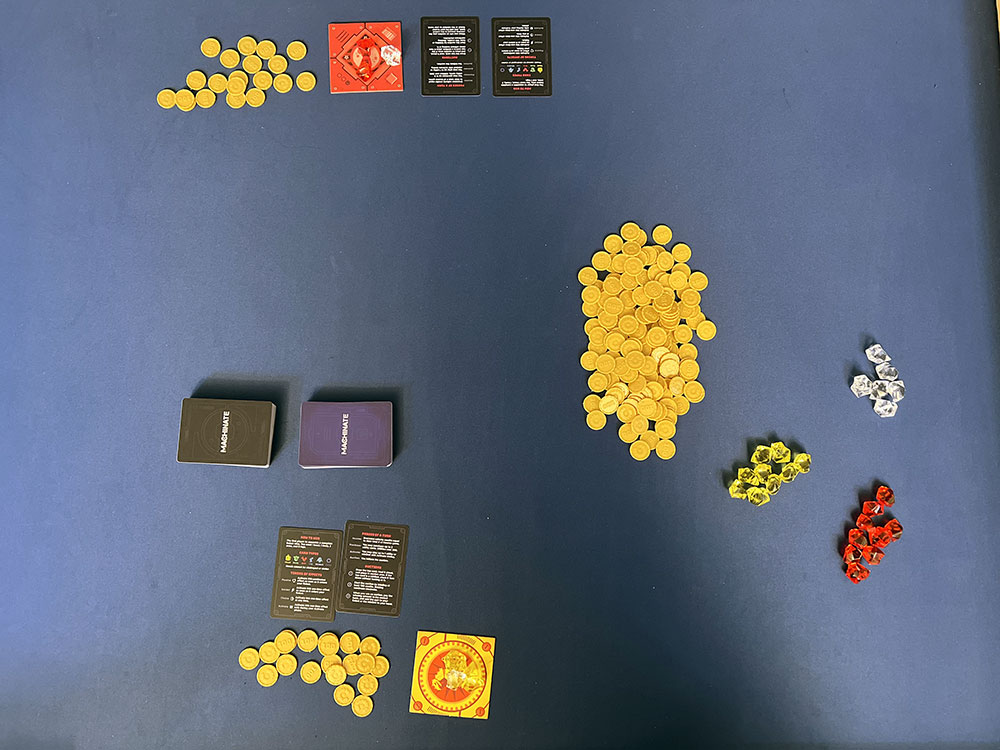 Auction games and race games are two of my absolute favorite types of games, so when Mahraan Qadir & Zach Johnson reached out to offer up their title Machinate for review, I knew I had to jump at the chance. Advertising itself as both an auction and race game at once grabbed my attention immediately. So does it live up to its hype and promise? How does a game dance with what seems to be diametrically opposed mechanics? Let’s find out.
Auction games and race games are two of my absolute favorite types of games, so when Mahraan Qadir & Zach Johnson reached out to offer up their title Machinate for review, I knew I had to jump at the chance. Advertising itself as both an auction and race game at once grabbed my attention immediately. So does it live up to its hype and promise? How does a game dance with what seems to be diametrically opposed mechanics? Let’s find out.
Gameplay Overview:
Players in Machinate are working towards building a fully functional robot. For it to be complete, a robot must have six body parts: two legs, two arms, a chest, and a head. These body parts are randomly flipped up each round for players to auction off. The player to get all six body parts first wins the game.
But it’s not that simple. See, each body part has some rulebreaker, some special power on it. These range from an influx of cash, to destroying your opponent’s robot parts, to increasing the income you receive at the start of each turn. Partnering these special powers with Utility cards that players can purchase and (usually) activate on their turns leads to a ton of chaotic variety that spices up the simple “bid on the card that’s up for auction” turn structure.
Bid carefully, spend swiftly, and fight tooth and nail to outcompete and outpace your opponents in Machinate.

Game Experience:
Machinate is a chaotic time. I know I’ve described it as such already, but there really is no better word for it. At times it can make a game like Cosmic Encounter feel like Chess. And to be clear, I don’t feel this is inherently a bad thing: not every game needs to have open information and no luck. The difference between Machinate and other highly variable and surprising titles like Cosmic Encounter is that Machinate thinks it offers players more autonomy than it really does.

Let’s break down a full turn to unpack what I mean here. The first part of a player’s turn is that everyone gets income. This income value is based on the number of gems you have in front of you. This value starts out equal, but can increase with certain robot cards. Importantly, though, if that robot part is destroyed or removed, then the income value goes back down. So what can happen is that I have an income of 300, and my opponent has an income of 600, then I am being out-earned by 300 every single turn that I can’t destroy that part. And in order for me to destroy that part, I have to either get lucky with a Utility card, or purchase a robot part in the next auction (if one is available!) with a power to destroy, a tactic the higher-income player likely can prevent!
In the second part of each turn, the active player can purchase up to two Utility cards for 300 apiece. These Utility cards are purchased face-down and blindly, meaning only the purchaser knows what the card is, but only after it is purchased. As mentioned regarding the snowballing income issue, it can be quite frustrating to make purchases when you’re on the backfoot, simply hoping to draw the right card. Moreover, being behind on income creates a tempo-dampening problem. If I am losing pretty bad, my 300 minimum income lets me buy exactly one Utility card. Even if I coincidentally purchase the perfect cards, in order for me to work towards victory, I have to destroy my opponents’ cards, bringing us all back to square one. All that’s happened at that point is that we’ve lost a half hour of our lives.

Finally we have the auctions. These are some truly disappointing auctions, in my opinion. At the beginning of the game, these are aimless endeavors where the vagueness of value makes each auction feel like a complete guessing game. Sure, there’s still tension in that you don’t want to overspend, but there’s no evidence to go off of to determine if the decision you’re making is a solid one or not. Nearing the end of the game, though, these auctions come down to the person with the most money simply deciding if they want the card or not. Especially if two players have five of their six body parts, these auctions turn into the one with the money holding all decision making abilities while everyone else just waits and hopes to draw more random Utility cards.
With all of that said, if taken as a completely chaotic party-like game like Unstable Unicorns or Munchkin, this could be a good time! Playing this with my in-laws and younger siblings brought that joy out that can come from these random experiences: exciting moments, a few screams, and some words I can’t type here. It’s just sad that the game’s website’s marketing copy reads as if it is competing with Moonrakers or Ra, rather than those lighter titles.
Final Thoughts:
Taken as a modern-day hobbyist auction game, Machinate has too much randomness and swinginess to be enticing and competitive all the way through. The income system can also lead to frustrating snowballing situations. Taken as a light game of chaos like Unstable Unicorns, Machinate fits right in with its randomness and explosive moments. If you or your group are looking for a new title in the vein of Unstable Games’ titles, you’ll be right at home.
Final Score: 2 Stars – A messy auction and racing game to bring to parties and leave behind for game nights.
 Hits:
Hits:
• Fantastic art
• Powerful part and Utility powers
• Anyone can win at any point
Misses:
• Bloated production
• Randomness all the way down
• Anyone can win at any point





















